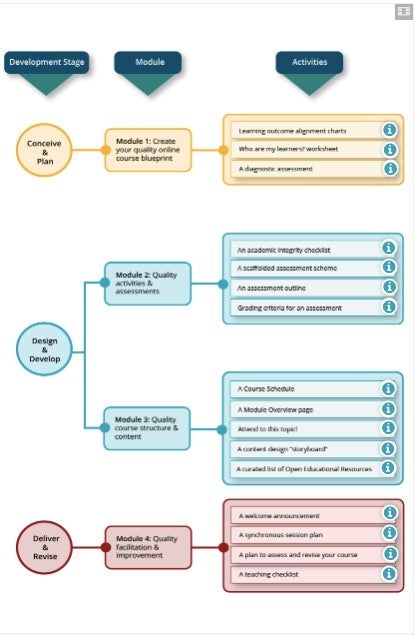
This article is one of a series celebrating open scholarship during Open Access Week. It is brought to you by the Open Scholarship Committee.
“It’s like bungee jumping without a cord.”
This is what Pia Zeni remembers an instructor saying about creating impactful online courses on their own.
For many years, instructors of online courses often lacked the support and tools to create successful online courses. Many instructors still feel they lack resources. Meeting this need are two new Open Educational Resources (OERs): High Quality Online Courses and Humanizing Virtual Learning.
High Quality Online Courses (HQOC) is a course on how to improve course design and delivery for post-secondary learners. Humanizing Virtual Learning (HVL) is a guide to help post-secondary educators foster engagement, connection, and inclusivity in an online learning environment.
Housed on eCampusOntario’s Open Library Publishing Platform, both courses are licensed under the Ontario Commons License as well as a Creative Commons Attribution-NonCommercial-ShareAlike 4.0 International License. These licenses permit copying, reuse, and modification. However, the Ontario Commons license limits use to educators at Ontario colleges and universities, while the additional CC license allows for use by anyone, anywhere in the world.
Providing support to all online instructors was one of the course authors’ objectives. While conceptualizing these courses, authors Daniel Opperwall, Kristin Wilson, and Pia Zeni recognized that most institutions were not as well-resourced as Waterloo when it came to instructional designers and multimedia developers.



Pia Zeni, Kristin Wilson, and Daniel Opperwall, Centre for Extended Learning (left to right).
Instructors of online courses wanted pragmatic instruction with workable examples. They were asking “what does it look like?” and wanting to “see it.” HQOC and HVL were designed to provide that visual, said Zeni.
HQOC does this particularly well, as Zeni pointed out, ending each module with activities that allow educators to effectively build and plan actual parts of an online course.

© University of Waterloo. Made available under CC BY-NC-SA 4.0
Because HQOC and HVL are open educational resources (OERs), instructors are able to customize them to suit their individual needs. “That’s the beauty of it,” said Opperwall. He pointed out that while a book can’t be reworked into something new to fit a different or more specific scenario, OERs are endlessly customizable. “You can mix and match, tweak it, change it, grab pieces of it…the possibilities are endless and more economical, and knowledge is being shared and built on,” Opperwall commented.
Not only can end users easily adapt the courses for their own uses, the authors can also update them. HQOC has not even been live a full year yet and Zeni has already been proactively adding to the “Resources for Further Study” sections when she finds something that would have been great to include. “I’ve already done that once or twice…and that’s one of the nice things about OERs. They are very easy to edit,” she said.
OERs will be increasingly important in academia, predict Opperwall and Zeni. Opperwall is currently involved in designing two more OERs, sponsored by the University of Waterloo Library through the OER Fellows Program. When asked what he would tell someone interested in creating or adapting an OER, he said, “I think what I’d say is why not? …This is going to be so much fun [and] it’s going to be so rewarding.”